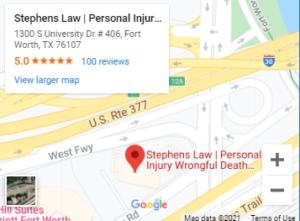Eye Injury
Eye injuries come in many forms. Not all eye injuries are the result of direct trauma to the eye; sometimes these injuries are caused by a blow to the head. Unfortunately, an eye injury can leave injury victims with permanent visual impairment and affect their ability to work and perform basic daily tasks. Eye surgeries and treatments can also be extraordinarily expensive as the eye is a sensitive part of the skull.
According to one study, about 27% of eyes that suffered a serious injury resulted in “legal blindness,” or final vision poorer than 20/200. The study identified risk factors for blindness from eye trauma including victims over 69, injuries sustained in a fall, and injuries caused by assault.
Table of Contents
What are the Most Common Eye Injuries?
Eye injuries commonly result from:
- Chemical burns
- Thermal burns like welder’s eye (photokeratitis)
- Subconjunctival hemorrhage, which happens when the blood vessels in the white of the eye rupture
- Retinal detachment, which occurs when retinal tissue tears away from the eye due to a direct blow or a fall
- Detached lens, an injury usually caused by blunt force trauma to the eye
- Ruptured globe, an injury to the cornea or sclera
- Hyphema or bleeding between the cornea and iris
- Corneal abrasion or a scratch on the eye
- Puncture wounds or eye loss
- Traumatic iritis, which is a type of swelling around the pupil which usually happens after blunt force traumaOrbital hematoma or a blood clot that occurs behind the eye
- Certain types of injuries also have a higher rate of causing blindness such as rupture, perforation, retinal detachment, vitreous hemorrhage, and endophthalmitis.
Even a seemingly minor eye injury can result in substantial vision loss.
What Accidents Cause Eye Injuries?

It’s estimated that 2.4 million eye injuries happen in the United States every year, according to the American Academy of Ophthalmology.
About 35% of these injuries occur in people who are 18 to 45, commonly during the course of their job or in accidents involving household products.
The following are the three leading causes of eye injuries:
Workplace Accidents
About 2,000 workers suffer an eye injury on the job every day according to the CDC. Nearly one-third seek treatment in an ER for a work-related eye injury. Unfortunately, nearly 90% of the 800,000 work-related eye injuries that occur every year could have been avoided with eye protection.
On-the-job eye injuries occur in many ways. These injuries often involve:
- Penetration of objects like staples, wood slivers, or nails.
- Scraping or striking injuries when tiny particles like metal slivers or dust scrapes the eye or larger items strike the face and eye.
- Thermal and chemical burns from cleaning chemicals, industrial chemicals, or welding.
Among all industries, construction and industrial workers face the greatest risk of eye injuries, but these injuries can occur anywhere.
Slip and Fall Accidents
While many slip and fall accidents are minor, they can also result in serious, life-changing injuries. Along with spinal cord injuries, brain injuries, and back injuries, slip and fall accidents can also result in eye injuries. These injuries may happen due to blunt-force trauma to the eye in a fall or a sharp blow to the head.
Among the most common eye injuries in slip and fall accidents are corneal abrasion, hyphemia, and detached retinas.
Car Accidents
Traffic accidents are a common cause of eye injuries, particularly orbital fractures, hyphemia, and detached retinas. Between 2001 and 2008 alone, there were more than 75,000 eye injuries treated in ERs associated with traffic accidents involving bicyclists, pedestrians, motorcyclists, and passenger vehicles.
Car accidents often result in eye injuries when debris like glass penetrates or scratches the eye. An accident can also cause blunt force trauma to the head which results in eye trauma.
What Damages Are Available in an Eye Injury Case?
Eye injuries are often life-changing and frequently result in permanent vision impairment or even blindness. In addition to this very real harm, you may face costly medical bills, an inability to work, and difficulty performing basic tasks or enjoying your hobbies.
There are two avenues for recovering compensation for an eye injury:
- A personal injury claim is available to accident victims when negligence is to blame
- A workers’ compensation claim if the injury happened on the job.
Workers’ compensation is a no-fault system that does not require proving negligence, but benefits are mostly limited to lost wages, disability, and medical benefits. A personal injury claim allows you to recover for a broader range of damages including non-economic damages without intrinsic financial value.
Depending on the nature of your accident, you may be entitled to compensation for:
- Medical expenses, including any anticipated future medical costs associated with your eye injury. These medical expenses may include surgery, hospitalization, doctor visits, physical therapy and rehabilitation, medical devices, home health care, and psychological counseling
- Lost wages
- Disability or reduced future earning capacity
- Pain and suffering
- Disfigurement
- Mental anguish
- Emotional distress
If your injury has left you with permanent visual impairment, your non-economic damages like emotional distress may be worth more than your actual financial damages.
How Long Do I Have to File an Eye Injury Case in Texas?

You have a limited amount of time to file a personal injury lawsuit in Texas before you are barred from recovering compensation from the at-fault party. Under Texas Civil Practice & Remedies Code Section 16.003, you have just two years from the date of your accident to file a lawsuit with few exceptions.
Do not delay in pursuing your claim. If you wait, you may damage your claim and make it impossible to prove causation and liability.
Contact a Fort Worth Personal Injury Lawyer
When your eye injury is the result of someone else’s negligence or an on-the-job accident, you should not be left with a significant financial burden.
Jason Stephens of Stephens Law Firm, PLLC is here to fight for the full compensation you deserve.
Contact our Fort Worth injury office today by calling (817) 420-7000 to schedule a free consultation with a Fort Worth eye injury lawyer who can help.
Our personal injury law firm in Fort Worth, TX also provides:
- Assault Injury Lawyers in Fort Worth, TX
- Bad Faith Insurance Lawyers in Fort Worth, TX
- Birth Injury Lawyers in Fort Worth, TX
- Brain Injury Lawyers in Fort Worth, TX
- Car Accident Lawyers in Fort Worth, TX
- Child Sexual Abuse Attorneys in Fort Worth, TX
- Dog Bite Lawyers in Fort Worth, TX
- Knee Injury Lawyers in Fort Worth, TX
- Motorcycle Accident Lawyers in Fort Worth, TX
- Premises Liability Lawyers in Fort Worth, TX
- Product Liability Attorneys in Fort Worth, TX
- Slip and Fall Accident Lawyers in Fort Worth, TX
- Train Accident Lawyers in Fort Worth, TX
- Truck Accident Lawyers in Fort Worth, TX
- Uber Accident Lawyers in Fort Worth, TX
- Workers’ Compensation Lawyers in Fort Worth, TX
- Wrongful Death Attorneys in Fort Worth, TX

